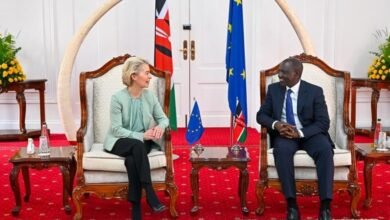
Kenya’s debt to China last year December stood at Ksh.806 billion representing 24 percent of the county’s total extern debt.
The Treasury record, however, shows the debt has been narrowed to Ksh.793 billion from December 2021 to March this year.
External debt currently stands at Ksh.4.1 trillion, with domestic debt standing at Ksh.3.9 trillion.
Central Bank of Kenya (CBK) Governor Dr. Patrick Njoroge in September last year said the country must take immediate action to manage its ballooning debt before it crushes the economy.
“We need to be clear in the direction debt is taking us. The time is now. We don’t need to wait until it is crushing us,” said Dr. Njoroge.
Kenya’s total debt service to revenues increased to 57 percent in 2019 from 17 percent in 2012 due to an increased debt stock and changing terms on new loans including one-off repayment of syndicated loans and Eurobonds in 2019.
These Chinese loans topped Ksh.517,06 billion after Standard Gauge Railway (SGR) was expanded in 2015 for another Ksh.165.04 billion by 75 miles to Naivasha.
Other major lenders are Japan and France. France accounts for seven percent of foreign loans.
The Treasury has in the budget estimates for the coming financial year from July listed Japan as the largest source of bilateral loans and grants, overtaking China which has been the biggest financier in nearly a decade.
China is projected to lend Kenya Ksh.29.46 billion for the fiscal year 2022/23, a sharp slide from Ksh.140.03 billion in the 2015/16 budget.
The Senate Finance Committee projects the country’s debt will be Ksh.337 billion shy of the Ksh.9.1 trillion limit by end of the current financial year, June 30, 2022.
”This will bring it to Ksh.337 billion short of Ksh.9 trillion debt ceiling and will result in the shortage of borrowing space to finance medium-term expenditure,” the Senate Committee on Finance says in the report.
Interest payment of debts has been estimated at Ksh.869 billion in FY 2022/23 against an expected ordinary tax collection of Ksh.2.14 trillion.
This implies the government might be forced to borrow to finance recurrent expenditure.
“It should be noted that the Government might have to borrow to fund recurrent expenditure given a deficit of Ksh.862 billion and development expenditure of at least Ksh.715 billion,” says PwC.
According to IMF, Kenya’s debt remains sustainable, but it is at high risk of debt distress.





